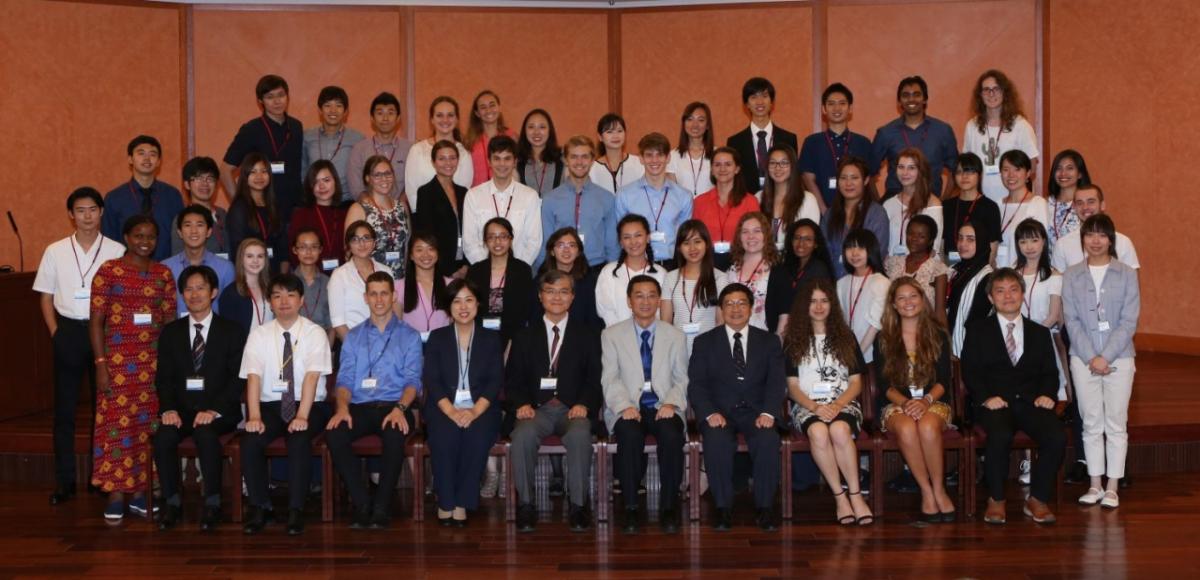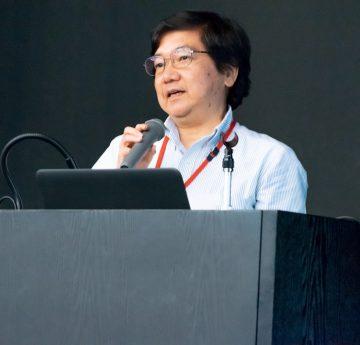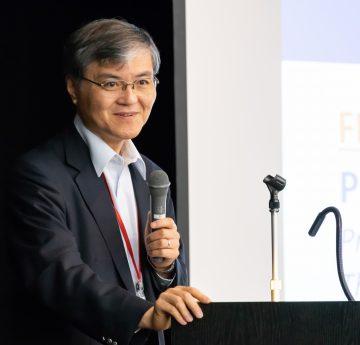Insights From 4 Years of Japan Amgen Scholars
The international reach of the Amgen Scholars Program is broader than ever before, with 8 new institutions in Asia, Australia, Canada, and the United States joining the Program in 2019 – bringing the total number of global sites to 24. As the Japan Amgen Scholars Program enters its fifth year, Steve Sugino, Vice President of Amgen, caught up with its Directors, Dr. Ichiro Sakuma, Professor at The University of Tokyo, and Dr. Fuyuki Ishikawa, Professor at Kyoto University, about their views on innovation, memorable student moments, and more.
This interview appeared in full in Japanese, published by the Nikkei. It has been edited here for length and clarity.
Sugino: Universities foster both research and education. As university professors, what are your perspectives on innovators and the skills they require?
Ishikawa: Innovation does not happen through planning. It requires the ability to sniff out the direction for creating innovative ideas. This calls for a wide range of knowledge outside your own area of specialty. On the other hand, there are certain patterns to innovation. This can be seen in the work of Taskio Honjo, Nobel Laureate of Physiology or Medicine, who reasoned that if some mechanisms strengthen immunity, then there must be others which weaken it. His great achievement stems from his discovery of such a mechanism on a molecular level. In my mind, this kind of scientific thinking is cultivated only through familiarity with many different case studies.
Sakuma: In engineering, we perform simulations of various phenomena and events. Many students are content to stop when the results match those of the experiment. However, that is not enough. Intriguing facts which lead to innovation can be hiding where things did not match. To find them, one needs to have an interest in a wide range of academic fields.
The benefits of dialogue with people from different nationalities and backgrounds is that there is a need to transform your thoughts into different shapes. We first think in Japanese, then speak in English to explain it to non-Japanese speakers, then put it in writing. This process gives birth to new ideas and the discoveries. -Dr. Fuyuki Ishikawa
Sugino: We humans tend to think that what we see is all there is. But, there are some things that we exist but are not visible from the angle of existing knowledge. When we acquire diverse knowledge and change our perspective, they come into view.
Ishikawa: There are other benefits of interacting with a diversity of people. For instance, the many thoughts we form in our minds are incomplete. They gradually fill in as others review our work and prompt us to reassess our ideas from new angles. The benefits of dialogue with people from different nationalities and backgrounds is that there is a need to transform your thoughts into different shapes. We first think in Japanese, then speak in English to explain it to non-Japanese speakers, then put it in writing. This process gives birth to new ideas and the discoveries.
Sugino: The Amgen Foundation partners with The University of Tokyo and Kyoto University to offer the Amgen Scholars Program in Japan. As program directors, what are your thoughts about its results?
Ishikawa: Since the Program is supported by the Amgen Foundation, we initially assumed its focus to be strictly the life sciences. However, Amgen Scholars spans a wide range of fields related to the biomedical sciences and beyond, including organic chemistry, biotechnology, environmental science, and electrical engineering. Another feature is that it brings together students from completely different backgrounds, be it nationality or economic status. I believe there is great significance in this diversity. In the summer, when the students came together for a poster session, I was astonished again and again at how knowledge of one field was being utilized in another. Continuing the Program will spur significant interdisciplinary innovation.
Sakuma: The Amgen Scholars Program is very fulfilling in terms of its design and financial support, so all of our departments want to accept students. At the University of Tokyo, we intentionally allocated the students into a wide range of fields, such as science, engineering, and pharmaceutical. As a result, the networks among those departments improved in the past 4 years we’ve hosted the Program. The Japanese students on the receiving end also observe these initiatives, and they perceive the importance of research which goes beyond conventional departmental frameworks. One manifestation of this may be the rising number of students who, once upon completing their bachelor’s degree, skip graduate school in favor of programs such as the Doctoral Program for World-leading Innovative & Smart Education by the Ministry of Education, Culture, Sports, Science and Technology.
The diversity of the students in the Amgen Scholars Program, whether it be nationality, area of specialty, economic circumstance, or way of life, is proving to be a major source of inspiration for the students in Japan. -Dr. Ichiro Sakuma
Sugino: Last year, Amgen Scholars in Japan brought together 44 students from 36 universities in 13 countries, including the United States, Brazil, Singapore, the Philippines, Egypt, and Rwanda. Have any students left an indelible impression on you during these four summers?
Ishikawa: For me, it was a student who came from Rwanda in the 1st year of the Program. She was a very motivated student, but during her stay in Japan, we noticed her abdomen growing larger and larger. She was pregnant. In Japan, and I assume also in the United States and Europe, pregnant women will usually avoid major changes in their environment, such as studying abroad, because of the risks such actions may pose. But this student didn’t let her pregnancy stop her from seizing this opportunity to study. Rwanda suffered a civil war two decades ago and is still recovering from its effects. This student was dynamic and determined to study abroad in the face of such adversity. Our Japanese students would do well to emulate her vitality and fierce motivation.
Sakuma: I heard about one student who, after finishing Amgen Scholars, went on to become a scuba diving instructor. I ran into her at an alumni reunion and she said she wanted to go into marine biology. It seems her experience underwater stimulated her interest in that field. In Japan, people who want to pursue an academic career trace a stereotypical path; that is, first getting into the lab of a professor in your chosen field, then working your way up to assistant, associate professor, and so on. I think it is invaluable for Japanese students to be shown these different paths, of being more flexible in deciding the course of your life. The diversity of the students in the Amgen Scholars Program, whether it be nationality, area of specialty, economic circumstance, or way of life, is proving to be a major source of inspiration for the students in Japan. At the same time, these diverse perspectives are leading to scientific innovations.




